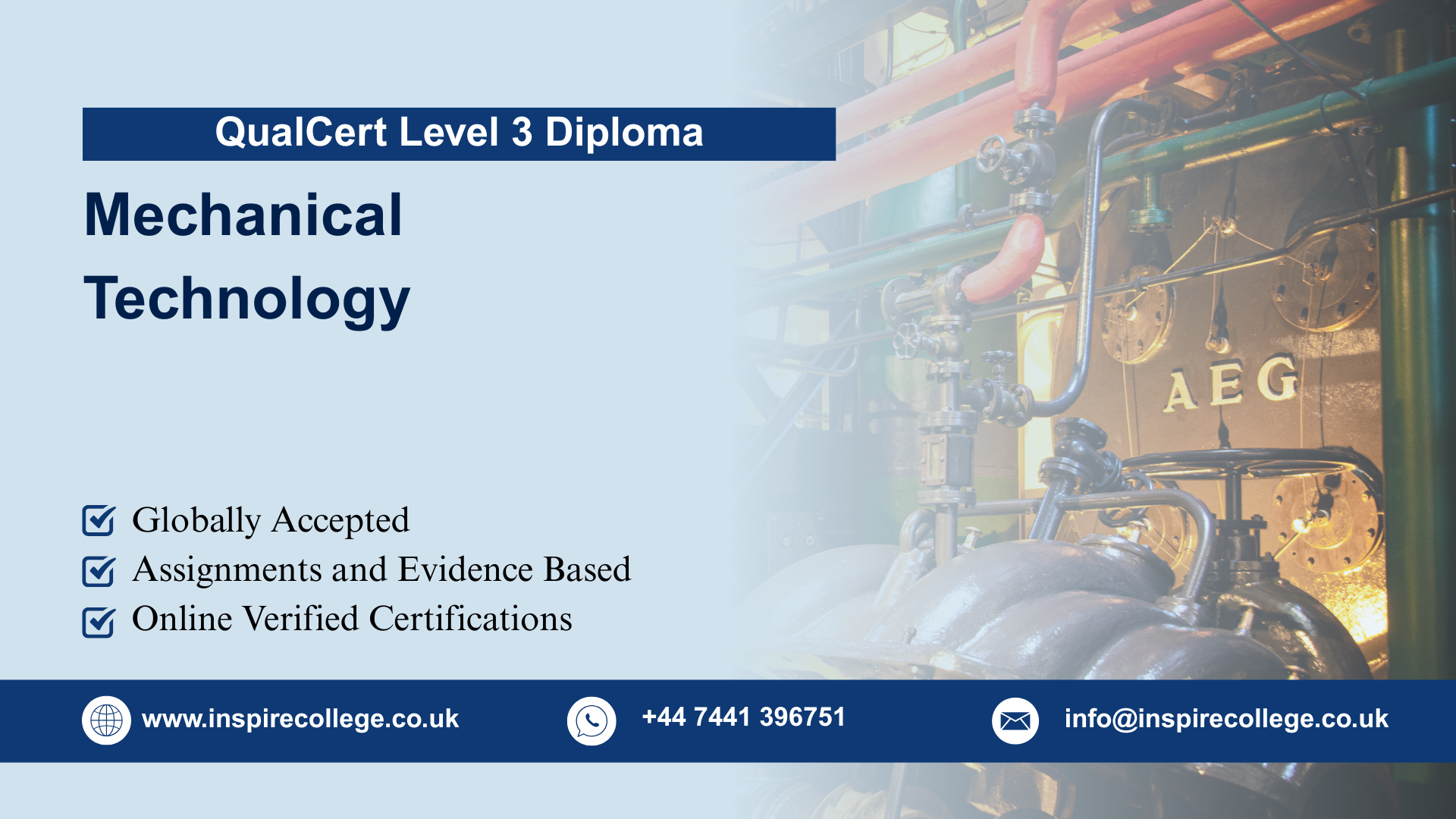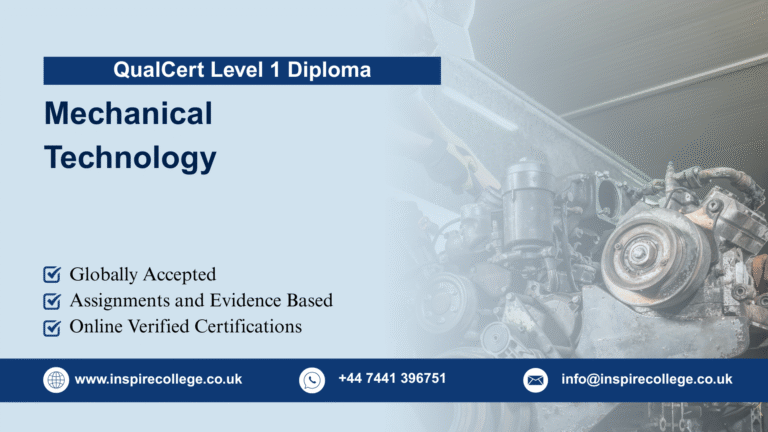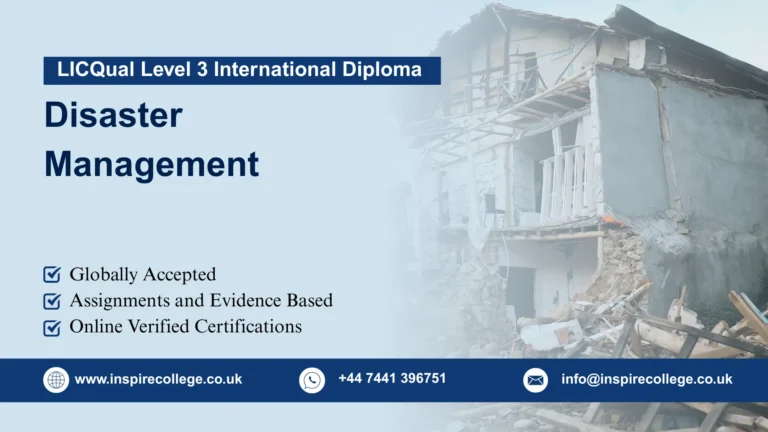
QualCert Level 3 Diploma in Mechanical Technology
The field of mechanical technology plays a vital role in driving innovation, manufacturing, and engineering solutions across industries such as automotive, aerospace, energy, and robotics. The QualCert Level 3 Diploma in Mechanical Technology is designed to equip learners with the essential technical skills, theoretical knowledge, and practical expertise required to excel in this dynamic sector. QualCert Level 3 Diploma in Mechanical Technology provides a strong foundation for those looking to begin their career in mechanical technology or progress to higher-level studies in mechanical and industrial engineering.
The purpose of QualCert Level 3 Diploma in Mechanical Technology is to develop both the intellectual understanding and hands-on capabilities needed to apply mechanical principles to real-world challenges. Learners will explore areas such as engineering materials, mechanical systems, industrial processes, computer-aided design (CAD), thermodynamics, and applied mathematics. With a balanced focus on theory and practice, QualCert Level 3 Diploma in Mechanical Technology ensures that graduates are fully prepared to meet the demands of modern engineering environments.
Throughout the program, learners will build problem-solving, analytical, and technical skills while gaining practical experience in workshops and laboratory settings. By the end of QualCert Level 3 Diploma in Mechanical Technology, students will be able to design, analyze, test, and maintain mechanical systems with a strong emphasis on efficiency, safety, and sustainability.
Whether aiming to enter the workforce as a mechanical technician, design assistant, or maintenance engineer, or planning to advance into higher-level engineering qualifications, the QualCert Level 3 Diploma in Mechanical Technology provides the knowledge, skills, and professional edge to succeed in today’s fast-evolving mechanical and manufacturing industries.
To enroll in the QualCert Level 3 Diploma in Mechanical Technology, candidates are expected to meet certain academic and personal criteria that ensure they are adequately prepared to succeed in the program. These entry requirements are designed to guarantee that learners have the foundational skills and background knowledge needed to engage effectively with the technical content of the course. The typical requirements include:
- Minimum Age Requirement
Applicants must usually be at least 18 years of age at the time of enrollment. This ensures that learners possess the maturity, discipline, and commitment required to undertake a professional qualification in mechanical technology. - Educational Background
Candidates are generally expected to hold a high school diploma or an equivalent qualification (such as a GED or similar international certification). Completion of secondary education demonstrates that learners have developed essential academic skills in mathematics, science, and problem-solving, which are fundamental for success in mechanical technology. Some institutions may specify minimum grade requirements in subjects like mathematics, physics, or general science to ensure readiness for technical coursework. - Language Proficiency
Since the primary language of instruction is English, learners must be able to demonstrate adequate language proficiency. Strong skills in reading, writing, listening, and speaking are vital to fully understand complex technical concepts, actively participate in discussions, and complete written assignments. Non-native speakers may be required to provide evidence of English proficiency through recognized tests such as IELTS, TOEFL, or equivalent qualifications. - Relevant Industry Experience (Recommended but not Mandatory)
While prior professional experience in the fields of engineering, manufacturing, or mechanical systems is not a strict requirement, it can provide valuable context for learners. Those with industry exposure may find it easier to relate course concepts to practical scenarios, especially in areas such as machinery operation, design processes, or maintenance practices. - Prior Qualifications (Preferred)
Although not compulsory, completion of a Level 2 Diploma in Mechanical Technology or an equivalent foundational program is highly recommended. This prior training provides learners with a strong base in essential mechanical principles, making the transition into Level 3 studies smoother and more manageable.
By meeting these entry requirements, learners can ensure they are well-prepared to engage with the technical, practical, and theoretical components of QualCert Level 3 Diploma in Mechanical Technology, setting a solid foundation for both academic achievement and future career progression in the field of mechanical technology.
Mandatory Units
The QualCert Level 3 Diploma in Mechanical Technology is a 60 credits qualification with a Total Qualification Time (TQT) of 300 hours, including 210 Guided Learning Hours (GLH). This course is thoughtfully designed to provide targeted and efficient skill development in the field of Mechanical, offering learners a solid foundation to build their expertise.
Mandatory Units
Learning Outcomes: QualCert Level 3 Diploma in Mechanical Technology
Upon successful completion of the QualCert Level 3 Diploma in Mechanical Technology, learners will be able to demonstrate knowledge, skills, and applied competencies in the following key areas:
Advanced Manufacturing Techniques
- Understand the principles and applications of advanced manufacturing methods and modern technologies.
- Gain proficiency in processes such as additive manufacturing, precision machining, CNC (Computer Numerical Control), and laser cutting.
- Evaluate the role of automation and digital manufacturing in enhancing productivity and efficiency.
- Assess material properties and select the most suitable manufacturing technique for various engineering products.
- Apply optimization techniques to improve production quality, reduce waste, and minimize costs.
Mechanics of Machines
- Demonstrate an understanding of the fundamental principles of mechanics, including motion, forces, energy, and equilibrium.
- Analyze the performance of mechanical systems and machine components under different operating conditions.
- Apply kinematics and dynamics principles to the design, operation, and troubleshooting of machinery.
- Evaluate the efficiency of machine systems and propose suitable engineering improvements.
- Use simulation and modeling tools to analyze and predict the performance of mechanical systems.
Thermal Systems & Refrigeration
- Understand the principles of thermodynamics and their application to heating, cooling, and refrigeration systems.
- Design, analyze, and optimize thermal systems, including heat exchangers and ventilation systems.
- Demonstrate practical knowledge of refrigeration cycles and modern cooling technologies.
- Evaluate the efficiency, sustainability, and environmental impact of various thermal and refrigeration systems.
- Diagnose and troubleshoot operational issues in HVAC and refrigeration systems.
Robotics & Automation
- Gain theoretical and practical knowledge of robotics systems, including sensors, actuators, and controllers.
- Understand the integration of automation technologies within industrial and manufacturing processes.
- Develop skills in programming, operating, and maintaining industrial robots for tasks such as assembly, welding, and material handling.
- Evaluate the advantages and limitations of robotics and automation in enhancing safety, efficiency, and productivity.
- Design and propose robotic solutions for real-world industrial applications.
Mechatronics Fundamentals
- Understand the interdisciplinary nature of mechatronics, integrating mechanical engineering, electronics, control systems, and computer science.
- Design and develop mechatronic systems by integrating hardware, software, and mechanical components.
- Gain practical skills in sensors, embedded systems, and real-time control of machines.
- Apply problem-solving strategies to diagnose and troubleshoot mechatronic systems.
- Explore applications of mechatronics in automotive, robotics, aerospace, and advanced manufacturing.
Project Management & Engineering Economics
- Understand and apply the principles of project management, including planning, scheduling, budgeting, and risk management.
- Apply engineering economics to assess project costs, feasibility, and financial performance.
- Develop the ability to manage engineering projects to meet time, budget, and quality constraints.
- Conduct cost-benefit and lifecycle analysis for engineering projects to support decision-making.
- Build leadership and communication skills to manage teams and engage stakeholders effectively throughout project execution.
These outcomes ensure that learners not only gain theoretical knowledge but also develop practical, problem-solving, and industry-relevant skills, preparing them for progression into higher qualifications or professional roles in mechanical engineering, manufacturing, and technology-driven industries.
The QualCert Level 3 Diploma in Mechanical Technology is designed for ambitious learners, professionals, and enthusiasts who are eager to advance their knowledge and practical skills in the field of mechanical engineering and applied technology. QualCert Level 3 Diploma in Mechanical Technology is particularly well-suited for:
- Level 2 Diploma Graduates – Learners who have successfully completed a Level 2 Diploma in Mechanical Technology or an equivalent qualification and wish to progress to the next stage of their academic and professional journey. This course provides deeper insights into manufacturing systems, robotics, thermal systems, and mechatronics, preparing graduates for more advanced study or industry roles.
- Practicing Engineers and Technicians – Professionals already working in mechanical, manufacturing, or industrial engineering who want to upgrade their technical expertise, develop leadership potential, and gain a recognized qualification to support career progression.
- Academic and Technical Learners – Students with a solid foundation in science, mathematics, or engineering who wish to specialize in mechanical technology and strengthen their skills for higher-level qualifications such as a Level 4 Diploma or Degree in Mechanical Engineering.
- Innovators, Designers, and Researchers – Individuals interested in research, product development, and innovation in areas such as automation, robotics, and advanced manufacturing technologies. This diploma offers a platform to contribute to technological advancements in the engineering sector.
- Career Changers and New Entrants to the Industry – Those considering a career transition into mechanical engineering or advanced manufacturing will find this diploma valuable in gaining the practical knowledge, technical expertise, and industry-relevant skills needed to establish themselves in this fast-growing field.
With its focus on both theory and practical applications, QualCert Level 3 Diploma in Mechanical Technology is perfect for anyone aiming to build a strong foundation for career advancement, further academic study, or entry into specialized areas of mechanical engineering and technology.o enter the industrial sector with a solid foundation in quality control, QualCert Level 3 Diploma in Mechanical Technology offers the knowledge, skills, and certification to help you succeed.
Register Now
FAQs for QualCert Level 3 Diploma in Mechanical Technology






